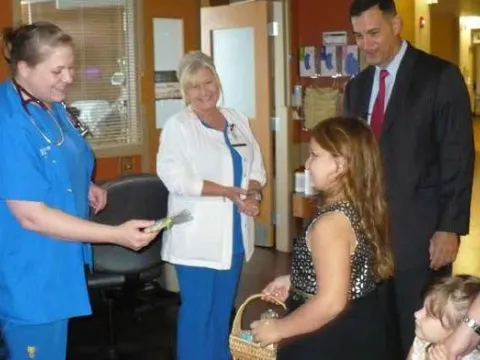- AdventHealth Foundation Central Florida
Choose the health content that’s right for you, and get it delivered right in your inbox.

Daria Igudesman is the epitome of a multi-talented individual. At just 34 years old, she has already made a successful transition into her second career. Starting in communications and writing about health and wellness, Daria made a bold move to return to school and pursue her passion in the field of nutrition, specifically focusing on helping people with diabetes live their best life.
Daria's interest in nutrition began in childhood. "There were a couple of personal threads that led me into this field." Those two threads—dancing and her mother. As a teenager growing up in San Francisco, Daria studied Latin ballroom dance, where she witnessed firsthand the struggles of dancers with eating disorders. In addition, she grew up watching her mother battle weight issues, pre-diabetes, and later, being diagnosed with type 2 diabetes. Combining the two experiences sparked her interest in studying nutrition and its impact on the body. "I was motivated to pursue research in this field, especially because of my mother. More recently it was heartbreaking to see her struggle with managing her blood sugar levels daily, and I knew I had to do something about it," Daria reflected.
Fast-forward a decade, and now armed with Ph.D. in nutritional epidemiology, Daria is the newest postdoctoral fellow at the Translational Research Institute, where she can combine her expertise in nutrition with cutting-edge research focusing on the gut microbiome and its connection to people with Diabetes.
Gut microbes play a significant role in the human body and can impact everything from the intestine to most organs in the body. Daria is interested in understanding the impact of gut microbes on clinical outcomes in diabetes and obesity. The way gut microbes impact the body is through the metabolites they produce, which are absorbed across the colonic lining into the bloodstream and can affect various parts of the body, such as the liver, fat tissue, brain, and hormones. Although there have been many studies on the gut microbiome, Daria believes there is still a lot to learn about the impact of gut microbes on human metabolism, and she is dedicated to finding answers through her work at TRI.
As part of a consortium of researchers from UNC, Stanford, and AdventHealth who are working together, Daria's goal is to make sense of the vast amount of information on the gut microbiome and design a study that establishes a cause-and-effect relationship between specific gut microbes or their metabolites and clinical outcomes in people with type 1 diabetes. "What we are trying to understand ultimately is, is this important enough to continue studying, within the context of the many other aspects of diabetes management? Is this important enough to intervene upon when people are diagnosed with T1D, either initially or over the course of the lifespan?"
After some unexpected twists and turns, Daria says she feels at home at TRI and is excited to be part of the TRI team. "There are so many people who really care about patients and want to improve the lives of patients. Especially working under Dr. Richard Pratley, who is an absolute rockstar, both as a physician and a researcher. He's just a pleasure to work with. We have a lot of unique capabilities here that a lot of other research institutes don't have. It's really a pleasure to be able to learn here."
Daria's passion and dedication are a testament to the impact that one person can have on the world. In addition, her work serves as a reminder of the power of science and the importance of continued research in finding new treatments for diabetes.





